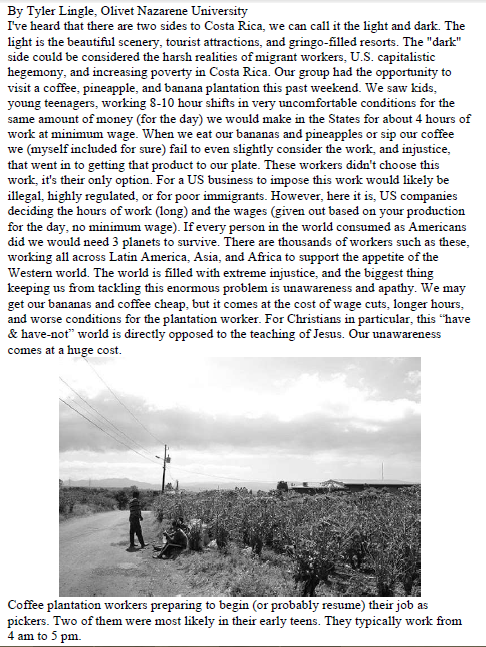In order to
reflect on their time in their rural community immersions in Nicaragua,
students share a poem about an individual in their communities that impacted
their lives and taught them lessons they will never forget. Here are some of
our students’ poems...
It’s risky
to see people.
Take a look.
Clean that
dust from your glasses,
And look
again.
You can’t
stop knowing.
That’s the
price you pay,
That you can’t
unsee.
The first
time I saw you I was intimidated.
Your face
was still as the heavy air.
Your voice a
breeze.
And at first
you intimidated me.
Dressed in a
red blouse covered in white lace,
And I was
intimidated.
But here is
what I know.
Here is what
I saw.
That your
daughter gave up her bed for me.
A bed in a room
with pictures
of a quiceñera,
And of you.
In a red
blouse covered in lace.
That you
left young to escape one man.
And now you
work for another.
That I liked
the art on your wall,
Color on a
concrete wall.
That the
next day you bought me jewelry,
Color on
concrete skin.
That you
braided my hair every morning.
You said it
looked like gold.
But I swear,
mamá,
any gold you found was woven there by your fingers, soft as paintbrushes.
And that I
know, the way I know that there are still sunsets on rainy days, that no more
days will pass that you don’t pray for me.
That you
were praying already before we met.
And when you
spoke English
You laughed.
And when I
left you cried.
And your
face rippled.
Your voice cracked.
And I see
you mamá.
And I will
not unsee you.
Savannah Hadley, Seattle Pacific University
Humans
aren’t the only ones
Who face a
different reality.
When there
isn’t enough
There is a
multitude of hungry mouths waiting
Under the
table.
Their eyes
follow every hand movement
Hoping that
it will be careless
And
something will fall.
Among the
dogs and chickens
Is a tiny
black cat
Practically
a bag of fur and bones,
Darting
after every scrap,
Asking for
more,
And then
kicked aside when he is too loud.
I asked what
his name was
But he
doesn’t have one.
“meow,” or “negro,”
maybe
But they
don’t talk about him
Except to
complain about the meows,
And don’t
need to call him
Because they
don’t feed him.
So why is he
there?
I have no
idea.
He is not
used for comfort or love
And does not
seem to have a job.
When he is
not begging for food
He sits in
the sun
Soaking in
the warmth.
That, he
doesn’t get from people.
One time,
He sat near
my sister as she played on her phone,
Some game
where she had to take care
Of a cat:
Feed it,
Bathe it,
Play with it.
And I looked
at the hungry, dirty, lonely kitten at her feet
And tried to
understand.
Some things
are easier to fix on a screen,
In a game,
Because the
real world has problems we don’t want to face.
Stephanie Cooper, Trinity Western University
Mujer Callada
Tu mundo es silencio.
Contra cada mandado
Aceptas tu papel,
Como la menor.
Como la mujer de la cocina
Preparas cada comida
Sin objeciones
Como la ama de casa
Lavas y limpias todo
Como si fuera tu deber.
Y en cada situación
No respondes con enojo.
No respondes con actitud.
Simplemente haces.
¿Porque haces todo esto?
¿Porque no rechazas tu papel?
Porque no conoces mi mundo.
No conoces otra vida
Afuera de la tuya.
Entonces cumples con tu papel.
Pero, lo haces con amor,
Con cariño, con paciencia, con
respeto.
Como si fueran tus deberes
cristianos.
Por eso, no “das comida” a tu
familia.
La nutres.
No “lavas y limpias” tu casa.
Les cuidas.
Y todo esto con una sonrisa y con
risas,
Con una fe fuerte en Dios.
Como la esposa del pastor, muestras
tu fe,
En acción. En canción.
Simplemente en como manejas tu vida.
Pero todavía eres callada.
Aunque estás embarazada.
Aunque eres diabética.
Aunque tienes mucho que decir.
Eres silenciosa.
Porque no es tu papel hablar.
Y lo aceptas con humildad.
Porque puedes hablar sin palabras.
Joel Kostelyk, Dordt College
Mamá Julia
Framed by
your dark, stern face,
Eyes that exceed
such pain.
Hands so wrought
and warn
To avoid all
other’s scorn.
Strength for
all to see
For weak you
musn’t be.
Unable to
write your very name,
Your daughter
destined for the same.
The free
will we celebrate
You never could
appreciate.
Living in
this slave state…
Of motherhood,
wifehood, womanhood.
These words,
these identities, these labels
Necessitate the
imposition of societal chains.
Expecting
you to tend, but not to mend, the tables.
Requiring
you to disregard your brains.
Inadequate
to search for knowledge that enables.
So what is
it that remains?
Well, there
is another side
That has a
different tale.
Hidden under
your iron veil.
A smile you
could not hide
Caused by
love, of family, of friends
Yet most
importantly, of God.
You loved me
with His love.
You looked
at me without judgement.
You did not
show me anger.
You cared
for me while I was sick.
You served
me while I was well.
You showed
me the undeserved love of the Lord.
Garrett Mullett, Seattle Pacific University



















